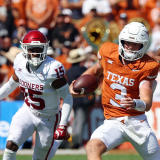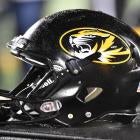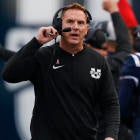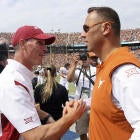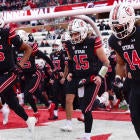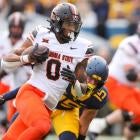Missouri football learned Tuesday that, to its dismay, the NCAA has upheld its postseason bowl ban on appeal. Also upheld were additional recruiting-based restrictions against the football program.
On Jan. 31, Missouri was handed a bowl ban and a series of sanctions stemming from an academic fraud case. The school immediately appealed, claiming the NCAA Infractions Committee had "abused its discretion." A former tutor said she had helped athletes complete schoolwork.
Mike Glazier, Missouri's attorney who has been helping schools out of infractions jams for the last 32 years, reacted to the verdict with a new outlook on how to deal with the NCAA. He told CBS Sports that he will advise schools in the future that they "will probably not get credit" for cooperating with the NCAA.
"What I've always been hopeful of being able to say to [clients] is, 'When you cooperate, you're going to get credit for doing it.' I still have to tell them they have to cooperate. But when they say, 'Am I going to get credit?' my answer is going to be, 'I -- under the current system -- cannot guarantee that. My experience is that you will probably not get credit."
In response to Missouri's comments, the NCAA released the following statement on Wednesday: "While Missouri's disappointment is understandable, the rules and infractions processes are developed by NCAA members. If any member feels the rules and penalty structure are unfair, there is a clear path for them to suggest changes. The infractions process was collectively created and adopted by NCAA members, including Missouri. Committee on Infractions and Infraction Appeals Committee decisions are made by dedicated athletic administrators, university officials and members of the public who spend countless hours carefully considering the arguments advanced."
Mizzou officials appeared in front of the NCAA Appeals Committee in mid-July. The process dragged on until Tuesday -- more than four months after that meeting. Mizzou officials became increasingly frustrated as the appeal took longer than the usual 6-8 weeks to decide even as the program continually got praised by the NCAA for what was called "exemplary cooperation" during the case, according Glazier and athletic director Jim Sterk.
At a Tuesday press conference, Missouri passed out a side-by-side comparison of the cases involving Missouri and Mississippi State. Both had similar academic fraud charges. Mississippi State was given only recruiting restrictions and scholarship reductions. Its case was decided by the less intrusive negotiated resolution process.
That was never on the table for Mizzou, which was was given a postseason ban in three sports -- football, softball and baseball.
In one case, Missouri was cited by the NCAA Infractions Committee for one softball player getting help on two homework assignments. None of the 12 Missouri athletes involved was kept eligible from the assistance by the part-time tutor.
By SEC rule, Missouri's share of conference bowl money will be withheld because of the finding. Missouri said that would be approximately $8 million to $10 million.
"This penalty … has stopped being about whether Missouri is going to play in a bowl game or not," Glazier said. "It's a financial penalty."
Missouri sources contended an effort to streamline the NCAA enforcement process has failed. About five years ago in response to membership concerns, NCAA enforcement was told penalties were too inconsistent and that the process took too long.
Although NCAA has contended the average case spans nine months, several high-profile cases have lasted much longer.
Cases are now decided by rotating six-person infractions "panels," increasing the likelihood of inconsistent verdicts, Glazier said.
"I really feel for [enforcement chief] Jon Duncan because this decision is going to make the job he and his staff have to do way harder than it already it is," Glazier said. "They're going to tell schools to cooperate when schools are going to have to weigh [whether it's in their best interests to cooperate]."
SEC commissioner Greg Sankey also released a statement Tuesday admonishing the NCAA for its decision.
"... While there is no excuse for the actions of a single academic tutor and the small number of student-athletes involved, the penalties applied are unusually severe when fully considered. ... It is regrettable that so many innocent current Missouri student-athletes across three sports will miss postseason opportunities due to actions for which they were not responsible. Our disappointment related to the application of a postseason ban and the Infractions Appeals Committee's upholding of the decision after more than four months of deliberations is magnified by recent decisions in other cases with similar fact patterns. While it is important to hold accountable those individuals who engage in unethical behavior and conduct that fails to meet our expectations for integrity in college athletics, it is also important to fully consider the nuances and unique set of circumstances present in each case when setting penalties."
The bowl ban itself may be moot if Mizzou (5-6, 2-5 SEC) does not win its season finale against Arkansas on Friday, a victory that would have made it bowl-eligible. The Tigers are 12-point favorites against the Razorbacks (2-9, 0-7 SEC), which have not defeated a Power FIve opponent this season.
At the time of the penalties, Missouri cited the fact that it turned itself in and cooperated with the NCAA every step of the way. NCAA rules in such cases do allow for a postseason ban.



